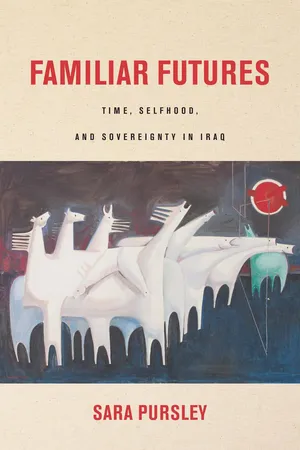
- 320 pages
- English
- PDF
- Available on iOS & Android
About this book
Iraq was the first postcolonial state recognized as legally sovereign by the League of Nations amid the twentieth-century wave of decolonization movements. It also emerged as an early laboratory of development projects designed by Iraqi intellectuals, British colonial officials, American modernization theorists, and postwar international agencies. Familiar Futures considers how such projects—from the country's creation under British mandate rule in 1920 through the 1958 revolution to the first Ba'th coup in 1963—reshaped Iraqi everyday habits, desires, and familial relations in the name of a developed future.
Sara Pursley investigates how Western and Iraqi policymakers promoted changes in schooling, land ownership, and family law to better differentiate Iraq's citizens by class, sex, and age. Peasants were resettled on isolated family farms; rural boys received education limited to training in agricultural skills; girls were required to take home economics courses; and adolescents were educated on the formation of proper families. Future-oriented discourses about the importance of sexual difference to Iraq's modernization worked paradoxically, deferring demands for political change in the present and reproducing existing capitalist relations. Ultimately, the book shows how certain goods—most obviously, democratic ideals—were repeatedly sacrificed in the name of the nation's economic development in an ever-receding future.
Frequently asked questions
- Essential is ideal for learners and professionals who enjoy exploring a wide range of subjects. Access the Essential Library with 800,000+ trusted titles and best-sellers across business, personal growth, and the humanities. Includes unlimited reading time and Standard Read Aloud voice.
- Complete: Perfect for advanced learners and researchers needing full, unrestricted access. Unlock 1.4M+ books across hundreds of subjects, including academic and specialized titles. The Complete Plan also includes advanced features like Premium Read Aloud and Research Assistant.
Please note we cannot support devices running on iOS 13 and Android 7 or earlier. Learn more about using the app.
Information
Table of contents
- Cover
- Contents
- Acknowledgments
- Note on Transliteration and Translation
- Introduction: Iraqi Futures and the Age of Development
- 1 Sovereignty, Violence, and the Dual Mandate
- 2 Determining a Self
- 3 The Gendering of School Time
- 4 The Stage of Adolescence and the Marriage Crisis
- 5 The Family Farm and the Peculiar Futurist Perspective of Development
- 6 Revolutionary Time and Wasted Time
- 7 Law and the Post-Revolutionary Self
- Epilogue: Postcolonial Heterotemporalities
- Notes
- Bibliography
- Index